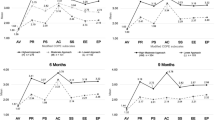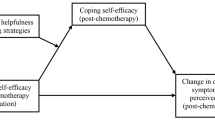Abstract
Coping, perceived control, and symptoms ofanxiety/depression were assessed in 70 women with breastcancer near their diagnosis and at 3- and 6-monthfollow-ups. Multiple regression equations wereconstructed to investigate the effects of coping, perceivedcontrol, and their interaction on anxiety/depressionsymptoms. Problemfocused engagement coping was relatedto lower anxiety/depression symptoms neardiagnosis;emotion-focused disengagementcopingwas related tomoreanxiety/depression symptoms at 6 months, controllingfor initial anxiety/depression; and problemfocusedengagement was marginally related to loweranxiety/depression symptoms at 6 months controlling for initialanxiety/depression. There were no main effects forperceived control. The interaction of problem-focusedengagement coping and perceived control was asignificant predictor of lower anxiety/depression symptomsonly near the time of diagnosis. Thus, thegoodness-of-fit effect, in which problemfocused copinginteracts with perceived control to predict lower levels of anxiety/depression, was replicatedcross-sectionally, but not prospectively.
Similar content being viewed by others
REFERENCES
Andersen, B. L., Anderson, B., & deProsse, C. (1989). Controlled prospective longitudinal study of women with cancer: II. Psychological outcomes. Journal of Consulting and Clinical Psychology, 57, 692–697.
Carver, C. S., Pozo, C., Harris, S. D., Noriega, V., Scheier, M. F., Robinson, D. S., Ketcham, A. S., Moffat, F. L., & Clark, K. C. (1993). How coping mediates the effects of optimism on distress: A study of women with early stage breast cancer. Journal of Personality and Social Psychology, 65, 375–391.
Compas, B. E., Connor, J., Osowiecki, D. M., & Welch, A. (1997). Effortful and involuntary responses to stress: Implications for coping with chronic stress. In B. Gottlieb (Ed.), Coping with Chronic Stress. New York: Plenum.
Compas, B. E., Malcarne, V. L., & Fondacaro, K. M. (1988). Coping with stressful events in older children and young adolescents. Journal of Consulting and Clinical Psychology, 56, 405–411.
Conway, T. J., & Terry, D. J. (1992). Appraised controllability as a moderator of the effectiveness of different coping strategies: A test of the goodness of fit hypothesis. Australian Journal of Psychology, 44, 1–7.
De rogatis, L. R., Morrow, G. R., Fetting, J., Penman, D., Piasetsky, S. S., Schmale, A. M., Henrichs, M., & Carnicke, C. L. M. Jr. (1983). The prevalence of psychiatric disorders among cancer patients. Journal of the American Medical Association, 249, 751–757.
Derogatis, L. R. & Spencer, P. M. (1982). The Brief Symptom Inventory (BSI): Administration, scoring, and procedures manual-I. Baltimore: Clinical Psychometric Research.
D'Zurilla, T. J., & Nezu, A. M. (1990). Development and preliminary evaluation of the Social Problem-Solving Inventory. Psychological Assessment, 2, 156–163.
Forsythe, C. J., & Compas, B. E. (1987). Interaction of cognitive appraisals of stressful events and coping: Testing the goodness of fit hypothesis. Cognitive Therapy and Research, 11, 473–485.
Hyne s, G. J., Callan, V. J., Terry, D. J., & Gallois, C. (1992). The psychological well-being of infertile women after a failed IVF attempt: The effects of coping. British Journal of Medical Psychology, 69, 269–278.
Kant, G. L., D'Zurilla, Y. J., & Maydeu-Olivares, A. (1997). Social problem solving as a mediator of stress-related depression and anxiety in middle-aged and elderly community residents. Cognitive Therapy and Research, 21, 73–96.
Mase l, C. N., Terry, D. J., Gribble, M. (1996). The effects of coping on adjustment: Re-examining the goodness of fit model of coping effectiveness. Anxiety, Stress, and Coping, 9, 279–300.
McClelland, G. H., & Judd, C. M. (1993). Statistical difficulties in detecting interactions and moderator effects. Psychological Bulletin, 114, 376–390.
Osowiecki, D. M., & Compas, B. E. (1998). Psychological adjustment to cancer: Coping and control beliefs in adult cancer patients. Cognitive Therapy and Research, 22, 483–499.
Stanton, A. L., & Snider, P. R. (1993). Coping with a breast cancer diagnosis: A prospective study. Health Psychology, 12, 16–23.
Taylor, S. E., Lichtman, R. R., Wood, J. V., Bluming, A. Z., Dosik, G. M., & Leibowitz, R. L. (1985). Illness-related and treatment-related factors in psychological adjustment to breast cancer. Cancer, 55, 2506–2513.
Terry, D. J., & Hynes, J. (1998). Adjustment to a low-control situation: Reexamining the role of coping responses. Journal of Personality and Social Psychology, 74, 1078–1092.
Thompson, S. C., Sobolew-Shubin, A., Galbraith, M. E., Schwankovsky, L., & Cruzen, D. (1993). Maintaining perceptions of control: Finding perceived control in low-control circumstances. Journal of Personality and Social Psychology, 64, 293–304.
Vitaliano, P. P., DeWolfe, D. J., Maiuro, R. D., Russo, J., & Katon, W. (1990). Appraised change ability of a stressor as a modifier of the relationship between coping and depression: A test of the hypothesis of fit. Journal of Personality and Social Psychology, 59, 582–592.
Weisz, J. R., McCabe, M., & Dennig, M. D. (1994). Primary and secondary control among children undergoing medical procedure s: Adjustment as a function of coping style. Journal of Consulting and Clinical Psychology, 62, 324–332.
Rights and permissions
About this article
Cite this article
Osowiecki, D.M., Compas, B.E. A Prospective Study of Coping, Perceived Control, and Psychological Adaptation to Breast Cancer. Cognitive Therapy and Research 23, 169–180 (1999). https://doi.org/10.1023/A:1018779228432
Issue Date:
DOI: https://doi.org/10.1023/A:1018779228432




